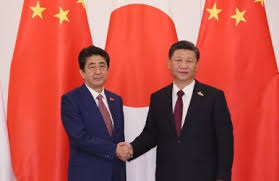Resumed strategic dialogue injects fresh momentum into China-Japan ties

Tokyo: China and Japan held a new round of strategic dialogue on Saturday, the first of such talks in seven
years and a new sign that the two countries’ relationship has come back to the right track and is moving forward steadily.
The two sides, headed by Chinese Vice Foreign Minister Le Yucheng and Japanese Vice Foreign Minister
Takeo Akiba respectively, exchanged views on bilateral ties and international and regional issues of common concern.
The dialogue shows the sincere willingness of both countries to search for new consensus on outstanding
issues, and serves as a booster for the further improvement and development of bilateral relations.
Initiated in 2005, the strategic dialogue had gone through 13 rounds by 2012, and played an important role in overcoming political obstacles and defining the important connotation and framework of bilateral strategic and mutually beneficial relations.
However, it was later suspended because of subsequent wrongdoings by the Japanese side, especially on issues of history.
Bilateral ties have shown signs of warming under the strategic guidance of the leaders of both sides in recent
years. Chinese President Xi Jinping met with Japanese Prime Minister Shinzo Abe ahead of the Group of 20
(G20) Osaka summit in June and reached a ten-point consensus to jointly promote the healthy development of bilateral relations.
At present, the China-Japan relationship is increasingly improving, a hard-won achievement which needs to
be maintained with determination and vision.
The long history of exchanges between the two countries demonstrates that China and Japan will benefit from
cooperation and lose from confrontation. Therefore, the two sides need to stay determined to strengthen their
political mutual trust so as to further promote their bilateral ties.
Only by sticking to this guidance can they make choices that serve the fundamental interests of the two
countries and are conducive to regional development.
Vision is also needed at a time when bilateral cooperation between the two countries is facing unprecedented
conditions and a rapidly changing global environment.
China and Japan share a broad range of common interests as the world is witnessing profound changes. The two countries, both champions of free trade, have huge potential for practical cooperation in many areas. The China-proposed Belt and Road Initiative can become a new platform for cooperation.
China and Japan shoulder the responsibility of maintaining peace and development in Asia and beyond. A
sound bilateral relationship is conducive to regional economic integration, and will inject new and important
impetus into economic cooperation in East Asia. Beijing and Tokyo can work together to uphold the
multilateral trading system and help build a more open world economy.
On the sidelines of the G20 Osaka summit, Xi accepted in principle an invitation from Abe for a state visit to
Japan next spring. As the two countries are working together to build up new momentum for bilateral
cooperation, it is expected that the relationship between China and Japan will embrace a new spring.





